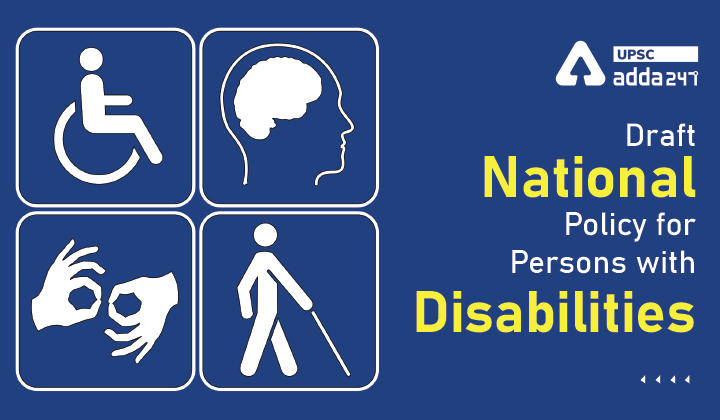Table of Contents
Draft National Policy for Persons with Disabilities: Relevance
- GS 2: Welfare schemes for vulnerable sections of the population by the Centre and States
Person with disability: Context
- Recently, Ministry of Social Justice and Empowerment has invited public feedback on the new draft national policy on persons with disabilities (PwD), which proposes interventions in disability prevention, education, healthcare, social security and accessibility.
Draft National Policy for Persons with Disabilities: Key points
- According to the draft policy, the current national programme on prevention of disabilities focused on “traditional causes”, but there were other causes of disability, such as malnourishment, medical negligence, socio-cultural factors and impairment caused by disasters.
- The Rights of Persons with Disabilities (RPD) Act, 2016 expanded the number of disabilities from seven to 21. However, the issue of disability remained un-resolved on majority of the issues.
- The draft policy called for a comprehensive national programme on prevention of disabilities and other medical conditions that could manifest as a disability.
- The draft stated that one-third of most disabilities in children were preventable, if detected early.
- The draft policy also said the States and Union Territories should add a provision on compliance with the RPD Act when granting permission or recognition to educational institutions.
- Besides, a module on disability should be included in MBBS and other medical courses for better understanding of the issue.
- The Ministry of Road Transport and Highways will be directed to issue necessary guidelines for making modification in the personal vehicles being used by persons with disabilities as per requirement.
- Revision of the policy was required as the existing national policy on disability was drafted in 2006, after which India signed the United Nations Convention on the Rights of Persons with Disabilities in 2007.
National Policy for Persons with Disabilities 2006
- Ministry of Social Justice and Empowerment formulated the National Policy for Persons with Disabilities in February 2006 which deals with Physical, Educational & Economic Rehabilitation of persons with disabilities.
Focus of the policy
- Prevention of Disabilities – The policy calls for programme for prevention of diseases, which result in disability and the creation of awareness regarding measures to be taken for prevention of disabilities.
- Rehabilitation Measures – Rehabilitation measures includes physical rehabilitation, educational rehabilitation, and economic rehabilitation.
- Women with disabilities – Special programmes will be developed for education, employment and providing of other rehabilitation services to women with disabilities keeping in view their special needs.
- Children with Disabilities – Children with disabilities are the most vulnerable group and need special attention. The Government would strive to: –
-
- Ensure right to care, protection and security for children with disabilities;
- Ensure the right to development with dignity and equality creating an enabling environment where children can exercise their rights, enjoy equal opportunities and full participation in accordance with various statutes.
- Ensure inclusion and effective access to education, health, vocational training along with specialized rehabilitation services to children with disabilities.
- Ensure the right to development as well as recognition of special needs and of care, and protection of children with severe disabilities.
- Barrier-free environment: The goal of barrier free design is to provide an environment that supports the independent functioning of individuals so that they can participate without assistance, in everyday activities.
- Issue of Disability Certificates – The Government of India has notified guidelines for evaluation of the disabilities and procedure for certification. The Government will ensure that the persons with disabilities obtain the disability certificates without any difficulty in the shortest possible time by adoption of simple, transparent and client-friendly procedures.
Read current affairs for UPSC





 TSPSC Group 1 Question Paper 2024, Downl...
TSPSC Group 1 Question Paper 2024, Downl...
 TSPSC Group 1 Answer key 2024 Out, Downl...
TSPSC Group 1 Answer key 2024 Out, Downl...
 UPSC Prelims 2024 Question Paper, Downlo...
UPSC Prelims 2024 Question Paper, Downlo...




